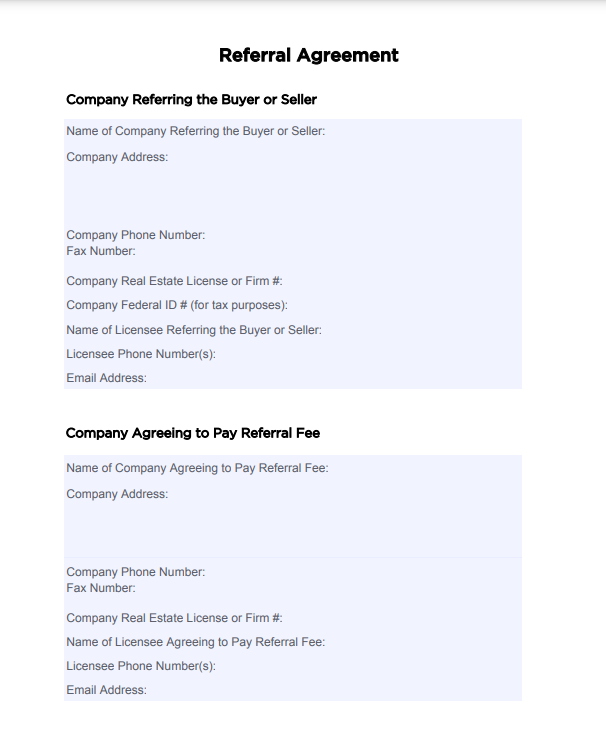Key takeaways
- 💰 A real estate referral fee is a percentage of the commission paid to an agent who refers a client to another agent. The referring agent is only compensated if the deal closes.
- 📊 Standard referral fees are typically around 25% of the receiving agent’s commission but can vary based on factors like market conditions and transaction complexity.
- 📝 A formal referral agreement should outline key terms, including the fee percentage, payment conditions, and expiration date. Download our free referral agreement template here!
- 💼 The receiving agent pays the referral fee from their commission — not the client — ensuring a seamless experience for buyers and sellers.
- 🚀 Referrals are valuable for new agents to build their client base, while experienced agents can use them to earn passive income without handling the transaction themselves.
What is a real estate referral fee?
A real estate agent referral fee is a payment made when one agent refers a client to another. This system encourages agents to share leads, ensuring clients receive the best possible service — even if their original agent isn’t able to assist them directly.
Referral fees help create a strong real estate networking system, allowing agents to connect clients with the right professionals for their needs. This benefits both the client and the agents involved, fostering collaboration and expanding business opportunities.
For new agents, referrals are an excellent way to start building their book of business, gaining experience and making connections early on. On the flip side, sending out referrals can be a great way to earn extra income without having to do the legwork — making it a win-win for everyone involved! 💰
The parties involved in a real estate referral
Real estate referrals include different parties with specific roles and responsibilities.🤝The following are some of the roles that are involved in a referral transaction:
-
Referring agent: The referring agent (or other real estate professional, like a lender or investor) recognizes that a client’s needs fall outside their geographic area or specialty and refers them to another agent. If the deal closes, they receive a referral fee.
-
Receiving agent: The receiving agent accepts the referral and works with the client to complete the transaction.
-
Client: The individual looking to buy, sell, or rent a property. They are connected with the receiving agent to ensure they receive the best possible service.
-
Broker: Brokers are licensed real estate agents with additional experience and education. They can act as either the referring or receiving agent, but not both in the same transaction.
Top 8 Sources for Pay at Closing Real Estate Leads in 2025
Who pays real estate referral fees?
Referral fees are paid by the receiving agent from their commission, not by the client. The client is only responsible for the total commission outlined in their agreement, while the receiving agent deducts the referral fee from their earnings.
This payment is typically made after the transaction is completed, ensuring that the referring agent is compensated only when the deal successfully closes.
How much is a referral fee?
The standard real estate agent referral fee is typically around 25% of the gross commission earned by the receiving agent. This rate is common for both residential and commercial transactions, but can vary based on the agreement between agents and other factors. 💸
The equation for computing the referral fee is as follows:
(Property sale price × Receiving agent’s commission) × Referral fee percentage = Referral fee
Factors that influence the referral fee
Referral fees can range from as low as 20% to as high as 35% based on factors such as:
Example referral fee calculation
A buyer is referred to a buyer’s agent, and the deal closes as such:
- Property sale price: $500,000
- Total commission rate: 6% (split equally between the listing and buyer’s agent)
- Buyer’s agent commission rate: 3%
- Referral fee percentage: 25%
Step 1: Calculate the Buyer’s agent’s commission
The buyer’s agent earns a percentage of the total sale price as commission.
📌 Formula:
Buyer’s Agent Commission = Property Sale Price × Buyer’s Agent Commission Rate
📌 Calculation:
$500,000 × 0.03 = $15,000
This means the buyer’s agent receives $15,000 in commission from the sale.
Step 2: Calculate the referral fee
The referral fee is a percentage of the buyer’s agent’s commission.
📌 Formula:
Referral Fee = Buyer’s Agent Commission × Referral Fee Percentage
📌 Calculation:
$15,000 × 0.25 = $3,750
This means the referring agent would receive $3,750 as a referral fee.
How to ask for a referral fee
Securing a referral fee requires clear communication and professionalism. Agents should confidently present the referral arrangement while ensuring transparency and fairness.
Here’s how to approach the conversation:
1. Establish the value of the referral: Before making the request, highlight the value of the referral. Emphasize how the client is qualified, motivated, and ready to proceed, making the transaction beneficial for both parties.
2. Be clear and direct: Clearly state the expectation of a referral fee upfront. Avoid vague language — let the receiving agent know the specific percentage being requested and ensure they are on board before making the referral.
3. Reference industry standards: Most referral fees fall within the standard 20% to 35% range of the receiving agent’s commission. Citing these industry norms can make negotiations smoother.
4. Put it in writing: A formal real estate referral agreement should outline all key terms, including the fee percentage, payment conditions, and expiration date. A written contract protects both parties and ensures there are no misunderstandings.
5. Maintain professionalism: Even if the other agent declines the referral fee, keeping the conversation professional strengthens relationships for future opportunities. If they push back on the percentage, be open to negotiation within reasonable limits.
6. Follow up: Once the deal is in progress, check in periodically and ensure everything is on track. After closing, politely remind the receiving agent of the agreed-upon fee and request timely payment.
By confidently and professionally asking for a referral fee, agents can maximize their earnings while fostering strong industry relationships. 💼🔑
Elements of a real estate referral agreement
A well-structured referral agreement ensures clarity and fairness for both parties. Before sharing or accepting referral leads, it’s essential to outline key terms to avoid miscommunication and protect both the referring and receiving agents.

A strong referral agreement should include:
Be prepared! Having a pre-made referral agreement saves time and ensures a smooth process when referral opportunities arise. A simple, ready-to-use contract allows agents to fill in the details and proceed efficiently.
Looking for a free, easy-to-use referral agreement template? Click the button below to download and get started today! ⬇️
Reasons why agents refer clients
There are many reasons to refer a client to another agent, but it always comes down to putting the client’s best interests first! A referral ensures they receive the expertise and service that best fit their needs. It may also be necessary when the work falls outside your scope or capacity, allowing the client to be better served.
Agents should consider referring clients to others in the following situations:
-
Geographic limitations: A client is interested in buying or selling property outside the agent’s normal market or region.
-
Specialized expertise: The client requires an area of expertise that falls outside the scope of the agent’s specialty. For instance, you might not specialize in commercial properties, luxury estates, or farms, but you know another agent who can better serve your client’s needs.
-
Too many clients: If the agent has accepted too many clients and is overwhelmed, they will not be in a position to provide new clients with the time needed to handle their cases.
-
Conflict of interest: An agent is faced with the possibility of a conflict of interest that would make objective representation of the client impossible.
-
Better fit: The agent knows of another professional who will be a better match for the client’s needs and preferences.
-
Legal or ethical requirement: The agent is legally or ethically bound to refer the client in compliance with regulations or professional requirements.
-
Client request: In some instances, a client might want to be referred to another agent.
-
Personal circumstances: The agent is not able to handle new clients because of personal circumstances, such as health issues or extended leave.
-
Market conditions: arket conditions and trends that you are unfamiliar with may necessitate handling by another agent to be effective.
-
Professional relationships: To develop professional relationships with other agents and brokers, referrals can help those relationships grow into a circle of trust and mutual benefits.
-
Related article: 20 Clever Real Estate Pop-by Ideas to Get More Referrals
What to do when a referral deal closes
Wrapping up a referral deal properly helps maintain strong professional relationships and increases the chances of future referrals. While the referring agent may check in, proactive communication ensures a smooth process and keeps the door open for more opportunities. 🔄
Here’s what to do next:
-
Confirm closure details: Confirm that everything regarding the deal has been closed out in accordance with the terms of the referral agreement. Every document needs to be signed and submitted!
-
Notify referring agent: The referring agent or broker should be notified regarding the successful closure. Any details regarding completion may be provided.
-
Calculate the referral fee: Calculate the referral fee amount based on the percentage of the commission paid as agreed upon. The amount must be calculated per the terms spelled out in the referral agreement.
-
Make the payment: Pay the referring agent or broker in a timely manner. Use the payment type set by the referral agreement, which might be a bank transfer or check.
-
Send documentation: Send a copy of the final closing statement, together with other documentation to be used, to the referring agent. Attach an itemization of how the referral fee was calculated.
-
Thank the referring agent: Don’t forget to thank them for the referral. This part is instrumental in maintaining a good relationship for future referrals. A gift could also be a nice gesture to maintain future lead flow.
-
Related article: 18 Clever Real Estate Marketing Ideas
Frequently asked questions (FAQs)
What's the difference between a referral fee and a commission?
A referral fee is a percentage of the commission paid to a referring agent for introducing a client to another agent. A commission, on the other hand, is earned by an agent upon completing a transaction, typically as a percentage of the property’s sale price. This commission is usually split between the listing agent and the buyer’s agent. If the buyer’s agent received the lead through a referral, a portion of their commission is paid as a referral fee.
What's the difference between a referral fee and a finder's fee?
A referral fee is a percentage of the commission paid between licensed real estate agents for introducing a client, typically outlined in a formal agreement. A finder’s fee, on the other hand, is often a one-time fixed payment given to someone — licensed or not — for introducing a deal. While referral fees follow industry regulations, finder’s fees must comply with state laws, especially when involving unlicensed individuals.
Can only real estate agents refer leads?
While licensed real estate agents and brokers typically make referrals, unlicensed individuals and other real estate professionals, such as mortgage brokers or attorneys, can also refer leads. Former clients also often refer friends or family, and may receive gifts or incentives instead of a referral fee!
How are typical real estate referral fees structured?
Real estate referral fees are typically a percentage of the commission earned by the receiving agent. Before making a referral, agents agree on the percentage through a written referral agreement. The standard fee is usually 25% of the full commission, but it can vary based on the specifics of the transaction. Clearly outlining the referral fee in writing helps maintain transparency and prevent misunderstandings.
Bringing it all together
A solid understanding of real estate referral fees fosters better collaboration between agents and ensures top-tier service for clients. 🔗 Referrals help expand an agent’s network, match clients with the right expertise, and lead to positive testimonials that strengthen credibility. ⭐
By building a strong referral system, agents can continuously generate new business opportunities 📈 while creating a thriving real estate ecosystem based on trust, cooperation, and mutual success. 🤝
Have you worked on a referral deal? 💬Share your experience below! ⬇️












